- Home
- Jane Smiley
The Age of Grief Page 3
The Age of Grief Read online
Page 3
But Philip has gone to the kitchen window. “Look over there. See that little building? I bought that at a farm sale for thirty dollars. It’s an old chicken house. Sound, though. I’m insulating it, and putting down a tile floor, then I’m going to install a Franklin stove and run lights out there and make it into my study. No phone, no nothing. Grapes growing all over it, a couple of easy chairs, a nice rug.”
“You’ve got all this space to yourself right here!”
He glances at her, amused that she hasn’t gotten the point, and shrugs. “The spirit of remodeling is pretty persistent, you know.”
“It’s so different from the way it was,” she says, because Philip’s cool realm oddly invites confidences in a way that Frannie’s hospitality did not, “and it’s not that I don’t like it. It’s refreshing. But I loved the rusty-red sofa, and all the chairs drawn up around the coffee table. That kitchen bar was so ugly—awful nineteen fifties modernizing—but it really made the place cozy.” Philip is looking at her quizzically. “Don’t you think it was nice to just sit around in the evening with most of the lights off and drink brandy and talk? I loved it! Especially when it rained or snowed those times, and even my apartment seemed too far away. Didn’t you like it?”
“Our friendship was very pleasant.”
“I didn’t feel like just your friend. I felt like your child or your sister, or something. Should I be embarrassed? Those nights seemed so self-contained.”
“Frannie mooning over Helen, me mooning over Frannie.” He speaks with a teasing edge. “I don’t think we were very kind to you, Florence.”
“Weren’t you? I thought you were.” Florence swallows bitterly.
“We needed someone else to talk to, about unimportant things.”
Florence turns away quickly and peers energetically out the window.
“We needed you, Florence; it was nice to have you fall in love with us, and admire us. It was a relief to talk about something else besides the central issue. Do you understand what I mean?”
“No one was happy but me?” She looks at him again and he shakes his head.
The smile that lingers on his boyish face is betrayed by that small gesture, disappears. Florence lets his serious gaze hold her until he releases her with another smile.
Bryan pulls up next door and gets out of the car. Florence does not move. “Is that the secret of marriage?” she asks.
“One of them.”
Bryan takes off his sunglasses and throws them on the seat, then steps around the car.
“What’s another one?”
“Maybe that all the secrets are never disclosed.”
“And another?”
“That it’s worth finding out for yourself.”
Bryan raises his finger to her doorbell. She shouts, “Here I am! Bryan, I’m over here!”
Lily
Careening toward Lily Stith in a green Ford Torino were Kevin and Nancy Humboldt. Once more they gave up trying to talk reasonably; once more they sighed simultaneous but unsympathetic sighs; once more each resolved to stare only at the unrolling highway.
At the same moment, Lily was squeezing her mop into her bucket. Then she straightened up and looked out the window, eager for their arrival. She hadn’t seen them in two years, not since having won a prestigious prize for her poems.
She was remarkably well made, with golden skin, lit by the late-afternoon sun, delicately defined muscles swelling over slender bones, a cloud of dark hair, a hollow at the base of her neck for some jewel. She was so beautiful that you could not help attributing to her all of your favorite virtues. To Lily her beauty seemed a senseless thing, since it gained her nothing in the way of passion, release, kinship, or intimacy. Now she was looking forward, with resolve, to making the Humboldts confess really and truly what was wrong with her—why, in fact, no one was in love with her.
A few minutes later they pulled up to the curb. Nancy climbed the apartment steps bearing presents—a jar of dill pickles she had made herself, pictures of common friends, a cap knitted of rainbow colors for the winter. Lily put it on in spite of the heat. The rich colors lit up Lily’s tanned face and flashing teeth. Almost involuntarily Nancy exclaimed, “You look better than ever!” Lily laughed and said, “But look at you! Your hair is below your hips now!” Nancy pirouetted and went inside before Kevin came up. He, too, looked remarkable, Lily thought, with his forty-eight-inch chest on his five-foot-nine-inch frame. Kevin kissed her cheek, but she could see he was trying to imagine where Nancy had gone; his eyes slid instantly past Lily and only manners brought them back. He patted her twice on the shoulder when she cried, “I’ve been looking for you since noon!” He said, “I always forget how far it is across Ohio,” and stepped into the house.
That it had been two years—two years!—grew to fill the room like a thousand balloons, pinning them in the first seats they chose and forbidding conversation. Lily offered some food, some drink. They groaned, thinking of all they had eaten on the road (not convivially but bitterly, snatching, biting, swallowing too soon). Lily, assuming they knew what they wanted, did not ask again. Immediately Kevin’s hands began to fidget for a glass to jiggle and balance and peer into, to turn slowly on his knee. Two years! Two days! Had they really agreed to a two-day visit?
Although the apartment was neat and airy, the carpet vacuumed and the furniture polished, Lily apologized for a bowl and a plate unwashed beside the sink. Actually, she often wondered whether cleanliness drove love away. Fastidious, she suspected that life itself was to be found in dirt and disorder, in unknown dark substances that she was hesitant to touch. Lily overestimated her neatness in this case. The windowsills, for example, had not been vacuumed, and the leaves of the plants were covered with dust. She began to apologize for the lack of air conditioning, the noise of cars and trucks through the open windows, the weather, the lack of air conditioning again; then she breathed a profound sigh and let her hands drop limply between her knees.
Nancy Humboldt was moved by this gesture to remember how Lily always had a touch of the tragic about her. It was unrelated to anything that had ever happened, but it was distinct, always present. Nancy sat forward and smiled affectionately at her friend. Conversation began to pick up.
After a while they ate. Lily noticed that when Kevin carried his chest toward Nancy, Nancy made herself concave as she sidestepped him. Perhaps he did not exactly try to touch her; the kitchenette was very small. Jokes were much in demand, greeted with pouncing hilarity; a certain warmth, reminiscent of their early friendship, flickered and established itself. Conversation ranged over a number of topics. Nancy kept using the phrase “swept away.” “That movie just swept me away!” “I live to be swept away!” “I used to be much more cautious than I am now; now I just want to be swept away!” Kevin as often used the word “careful.” “I think you have to be really careful about your decisions.” “I’m much more careful now.” “I think I made mistakes because I wasn’t careful.” Lily listened most of the time. When the discussion became awkwardly heated, they leaped as one flesh on Lily and demanded to know about her prizewinning volume, her success, her work. Nancy wanted to hear some new pieces.
Lily was used to reading aloud. Finishing the fourth poem, she wondered, as she often did, why men did not come up to her after readings and offer love, or at least ask her out. She had won a famous prize. Within the intimacy of art she phrased things that she would not ordinarily admit to, discussed her soul, which seemed a perfectly natural and even attractive soul. People liked her work; they had bought more copies of her prizewinning volume than of any other in the thirteen-year series. But no one, in a fan letter, sent a picture or a telephone number. Didn’t art or accomplishment make a difference? Was it all invisible? Lily said, “I think Kevin was bored.”
“Not at all, really.”
“I wasn’t in the slightest,” Nancy said. “They’re very good. They don’t have any leaves on them.” She laughed and looked around, pleased with her own phr
ase.
Now was the time to broach her subject, thought Lily. The Humboldts had known her since college. Perhaps they had seen some little thing, spoken of it between themselves, predicted spinsterhood. Lily straightened the yellow pages and set them on the side table. “You know,” she said with a laugh and a cough, “I haven’t gone out in a month and a half. I mean, I realize it’s summer and all, but anyway. And the last guy was just a friend, I—” She looked up and went on. “All those years with Ken, nobody even made a pass at me in a bus station. I didn’t think it was important then, but now I’ve gotten rather anxious.”
“Do you ever hear from Ken?” Nancy asked.
“I changed my number and didn’t give him the new one. I think he got the message.”
“I’ll never understand why you spent—”
“Nine years involved with a married man, blah blah blah. I know.”
“Among other things.”
“When we were breaking up, I made up a lot of reasons, but now I remember what it was like before we met. It was just like it is now.”
“Everyone has dateless spells, honey,” said Nancy, who’d had her first dateless spell after her marriage to Kevin. She had always attributed to Lily virginal devotion to her work. Nancy thought a famous prize certainly equaled a husband and three children. Love was like any activity, you had to put in the hours, but as usual Kevin was right there, so she didn’t say this and shifted with annoyance in her chair. “Really,” she snapped, “don’t worry about it.”
Kevin’s jaws widened in an enormous yawn. Lily jumped up to find clean towels, saying, “Does it seem odd to you?” Kevin went into the bathroom and Nancy went into the bedroom with her suitcase. Lily followed her. “I have no way of knowing,” she went on, but then she stopped. Nancy wasn’t really listening.
In the morning Nancy braided and wound up her hair while Lily made breakfast. Kevin was still asleep. Nancy had always had long, lovely hair, but Lily couldn’t remember her taking such pride in it as she was now, twisting and arranging it with broad, almost conceited motions. She fondled it, put it here and there. “It looks great in a long upswept braid,” she said. “And there’s a woman I go to who French-braids it. Then all the colors come out.”
“You’ve kept it in wonderful shape,” Lily said.
“My hair is my glory,” Nancy replied, and sat down to her eggs. She was not kidding.
When Kevin staggered from bedroom to bathroom an hour later, Nancy had gone out to survey the local shops. Kevin looked for her in every room of the apartment and then said, “Nancy’s not here?”
“She thought she’d have a look around.”
Kevin dropped into his seat at the table and put his head in his arms. A second later he exclaimed, “Oh, God!” Lily liked Kevin better this visit than she had before. His chest, which had always seemed to drag him aggressively into situations, had lost some of its influence. He was not as loud or blindingly self-confident as he had been playing football, sitting in the first row in class, then, later, barreling through business school, swimming two miles every day. Once, in a car, she had heard him mutter to her date, “I wouldn’t mind a good fight right now.” Thus it was with sympathy rather than astonishment that Lily realized he was weeping. He wiped his eyes on his T-shirt. “She’s going to leave me! When we get back to Vancouver, she’s going to leave me for another guy!”
“Is that what she said?”
“I know.”
“Did she say so?”
“I know.”
“Look, sit up a second and have this piece of toast.”
“He’s just a dumb cowboy. I know she’s sleeping with him.”
She put food in front of him and he began to eat it. After a few bites, though, he pushed it away and put his head down. He moaned into the cave of his arms. Lily said, “What?”
“She won’t sleep with me. She hasn’t since Thanksgiving. She never says where she’s going or when she’ll be back. She can’t stand me checking up on her.”
“Do you check up on her?”
“I call her at work sometimes. I just want to talk to her. She never wants to talk to me. I miss her!”
“What do Roger and Fred say?” Roger and Fred were friends from college who also lived in Vancouver, though no longer with Kevin and Nancy, as they had.
“They don’t understand.”
Lily nodded. Unlike Lily, Roger and Fred had wavered in their fondness for Nancy. Many times Nancy had been selfish about certain things, which were perhaps purely feminine things. She thought people should come to the table when dinner was hot in spite of just-opened beers and half-smoked cigarettes, or unfinished repair projects in the driveway. She had screamed, really screamed, about booted feet on her polished table. Roger and Fred especially found her too punctilious about manners, found her slightly shrill, and did not appreciate her sly wit or her generosity with food and lodging and presents (this liberality they attributed to Kevin, who was, actually, a famous tightwad). And they overlooked her capacity for work—her willing, organized, unsnobbish bringing home of the bacon while all the men were looking for careers and worrying about compromising themselves. Lily and Kevin at least agreed that Nancy was a valuable article.
“Okay,” Lily said, “who’s the dumb cowboy?”
“His name is Hobbs Nolan. She met him at a crosscountry ski clinic last year. But he’s not really outdoorsy or athletic; he just wears these pointy-toed cowboy boots and flannel cowboy shirts. Out there guys like him are a dime a dozen …”
“You know him?”
“I’ve seen him. He knows people we know. They think he’s a real jerk.”
“You blame him for all of this, then?”
Kevin glanced at her and said, “No.” After a moment he exclaimed “Oh, God!” again, and dropped his head on his arms. His hair grazed the butter dish, and Lily was suddenly repelled by these confidences. She turned and looked out the window, but Nancy was nowhere in sight. The freshness of the morning was gone, and the early blue sky had whitened. She looked at her watch. It was about ten thirty. Any other morning she would already be sitting down to her work with an apple and a cup of tea, or she would be strolling into town with her list of errands. She glanced toward the bedroom. The blanket was half off the bed and a corner of the contour sheet had popped off the mattress. Nancy’s and Kevin’s clothes were piled on the floor. They had left other items in the living room or the kitchen: Nancy’s brush, a scarf, Kevin’s running shoes and socks, two or three pieces of paper from Nancy’s purse, the map on which they had traced their route. But hadn’t she expected and desired such intimacy? He sat up. She smiled and said, “You know, you’re the first people to spend the night here in ages. I’d forgotten—”
“I don’t think you should worry about that. Like Nancy said, we all go through dry spells. Look at me, my—”
“Oh, that! I wasn’t referring to that.”
“My whole life was a dry spell before Nancy came along.”
Lily sat back and looked at Kevin. He was sighing. “Hey,” she said, “you’re going to have a lot better luck if you lighten up a little.”
“I know that, but I can’t.” He sounded petulant.
Lily said, “Well—”
“Well, now I’d better go running before it gets too hot.” Kevin reached for his shoes and socks. But Nancy walked in and he sat up without putting them on. Nancy displayed her packages. “There was a great sale on halter tops, and look at this darling T-shirt!” She pulled out an example of the T-shirt Lily had seen on everyone all summer. It said “If you live a good life, go to church, and say your prayers, when you die you will go to OHIO.” Lily smiled. Nancy tossed the T-shirt over to Kevin, saying, “Extra extra large. I’m sure it will fit.”
He held it up and looked at it and then said, glumly, “Thanks.”
“Are you going for your run now?”
“Yeah.”
But he didn’t make a move. Everyone sat very still for a long time, maybe
five minutes, and then Lily began clearing plates off the table and Nancy began to take down her hair. Kevin seemed to root himself in the chair. His face was impassive. Nancy glared at him, but finally sighed and said, “I got a long letter from Betty Stern not so long ago. She stopped working on her Chinese dissertation and went to business school last year.”
“I heard that Harry got a job, but that it was in Newfoundland or someplace like that,” Lily said.
“Who’d you hear that from?” Refusing even to look in Kevin’s direction, Nancy combed her hair.
“Remember Meredith Lawlor? Did you know she was here? She’s teaching in the pharmacy school here in Columbus. She raises all these poisonous tropical plants in a big greenhouse she and her husband built out in the country.”
“Who’s her husband?”
“She met him in graduate school, I think. He’s from Arizona.”
“I’d like to raise plants for a living. I don’t know necessarily about poisonous ones.” Nancy glanced at Kevin. Lily noticed that she had simply dropped her packages by her chair, that tissue paper and sales slips and the halter tops themselves were in danger of being stepped on. In college they had teased Nancy relentlessly about her disorderly ways, but Lily hadn’t found them especially annoying then. Kevin said, “Why don’t you pick that stuff up before you step on it?”
“I’m not going to step on it!”
“Well, pick it up anyway. I doubt that Lily wants your mess all over her place.”
“Who are you to speak for Lily?”
“I’m speaking for society in general, in this case.”
“Why don’t you go running, for God’s sake?”
“I’d rather not have a heart attack in the heat, thank you.”
“Well, it’s not actually that hot. It’s not as hot as it was yesterday, and you ran seven miles.”
“It’s hot in here.”

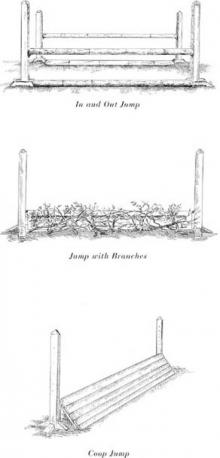 The Georges and the Jewels
The Georges and the Jewels Pie in the Sky: Book Four of the Horses of Oak Valley Ranch
Pie in the Sky: Book Four of the Horses of Oak Valley Ranch Duplicate Keys
Duplicate Keys Charles Dickens
Charles Dickens Good Faith
Good Faith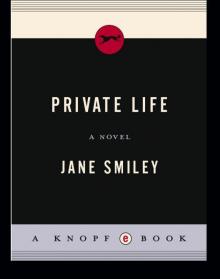 Private Life
Private Life A Thousand Acres: A Novel
A Thousand Acres: A Novel The Greenlanders
The Greenlanders Ten Days in the Hills
Ten Days in the Hills Gee Whiz: Book Five of the Horses of Oak Valley Ranch
Gee Whiz: Book Five of the Horses of Oak Valley Ranch A Thousand Acres
A Thousand Acres The All-True Travels and Adventures of Lidie Newton
The All-True Travels and Adventures of Lidie Newton Ordinary Love and Good Will
Ordinary Love and Good Will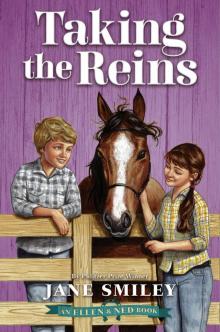 Taking the Reins (An Ellen & Ned Book)
Taking the Reins (An Ellen & Ned Book) The Man Who Invented the Computer
The Man Who Invented the Computer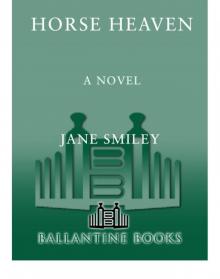 Horse Heaven
Horse Heaven The Age of Grief
The Age of Grief Riding Lessons
Riding Lessons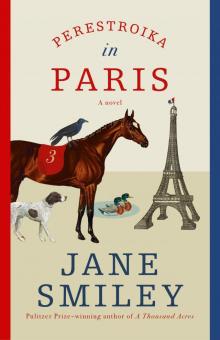 Perestroika in Paris
Perestroika in Paris A Good Horse: Book Two of the Horses of Oak Valley Ranch
A Good Horse: Book Two of the Horses of Oak Valley Ranch Saddles & Secrets (An Ellen & Ned Book)
Saddles & Secrets (An Ellen & Ned Book)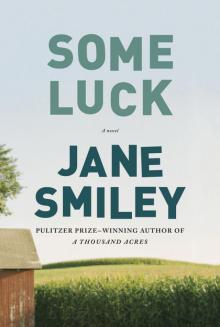 Some Luck: A Novel
Some Luck: A Novel Champion Horse
Champion Horse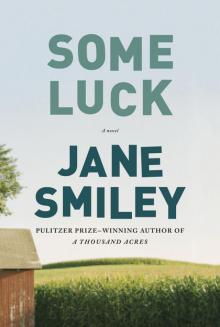 Some Luck
Some Luck Gee Whiz
Gee Whiz Barn Blind
Barn Blind A Thousand Acres (1992 Pulitzer Prize)
A Thousand Acres (1992 Pulitzer Prize) Pie in the Sky
Pie in the Sky True Blue
True Blue A Thousand Acres_A Novel
A Thousand Acres_A Novel A Good Horse
A Good Horse